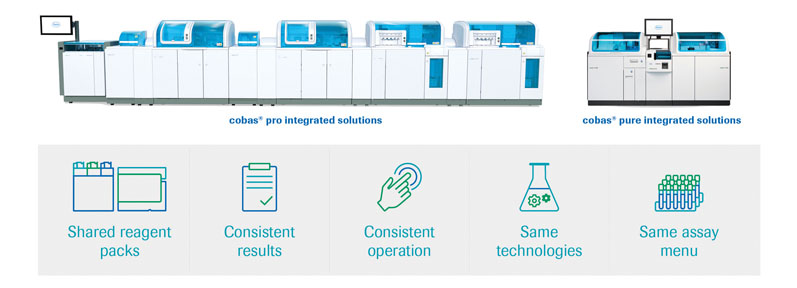This all manifests itself in the clinical laboratory. In response, a growing number of labs have joined forces and set up integrated healthcare networks to reduce costs, increase efficiencies and improve quality of care.
The result is a complicated puzzle of systems, processes and analysers that makes efficient operations and convenient co-ordination a challenge.
However, I see a clear path to both improving patient outcomes and driving operational efficiency: lab standardisation.
For us at Roche, standardisation means that, regardless of where the patient is tested, results can be reproduced and compared reliably in multiple disparate locations.
The benefits are many, including faster clinical decision making, improved accuracy of care and better optimisation of valuable resources. Let’s take a closer look.
Paving the way to quick and accurate diagnoses
Currently, a lab that uses non-standardised reference ranges for its tests requires devoted resources to baseline and reinterpret results. These workarounds and/or sample reruns increase the risk of diagnostic and treatment errors, while also demanding additional time, expenses and labour.

Benjamin Lilienfeld
By contrast, with standardised solutions, results can be reproduced and compared reliably at any time, no matter where the patient is tested. It’s a recipe for faster clinical decision making and more accurate care, as well as better patient management overall.
At Roche, we take this to heart. Our cobas pro and cobas pure integrated solutions, designed for larger and smaller labs, respectively, are based on the same hardware and software technology platforms.
They share reagents, consumables and master applications, and offer the same clinical chemistry and immunochemistry testing menu with more than 230 diagnostic tests. Their seamless design facilitates standardised operations across healthcare networks that choose both instruments.
Addressing the lab staffing challenge
We are all aware of how difficult it is to hire and retain skilled lab workers, and this trend is only expected to get worse.1 How can a lab, faced with this reality, find ways to become more flexible and agile with their staff?
I believe standardisation can play a vital role in solving this issue.
At Roche, we are working to simplify the daily operations of lab personnel. Our cobas pro and cobas pure integrated solutions have been designed to be as user-friendly and intuitive as possible, while also reducing system preparation time and hands-on maintenance.
As both instruments share a common graphical user interface, labs gain agility because the seamless design and experience reduces staff training requirements.

Standardise your operations with cobas integrated solutions: delivering seamless design today and into the future
This allows for more flexible allocation and easier staff rotation at different lab locations throughout the network. Additionally, through enhanced automated features, lab professionals are able to spend more time on value-adding tasks that influence patient outcomes, reducing the need for them to divert their attention to mundane routine tasks that have little impact.
It may seem like a minor point, but it has major implications: every minute saved shifting focus is a minute better spent elsewhere.
And let’s not undermine the human element: well-trained employees perform their work more efficiently, accurately and confidently.
Not only does this help to minimise human error, I believe that it helps to boost efficiency and productivity across the network, which, in turn, contributes to a reputational advantage that attracts top talent.
Impacting the bottom line
Standardisation also eases administrative burdens and ensures that the correct testing supplies are available when needed. We’re working to make the back-end operation of the lab as easy as possible.
Because cobas pro and cobas pure integrated solutions share the same reagents and consumables, labs can centralise purchasing for the entire network, with several benefits including simplified and easier inventory management as well as improved ordering efficiency.
Fundamentally, it’s about patients
Standardisation is more than just picking the same instrument manufacturer. Rather, it’s about simplifying lab operations to reduce potential errors and achieve reproducible and comparable results, irrespective of testing location.
Ultimately, this means that patients can benefit from improved speed and accuracy of care.
Reference
- https://healthcare-in-europe.com/en/news/addressing-the-critical-lack-of-skilled-lab-workers.html.
For more information on Roche’s analysers, please refer to the links below
- https://diagnostics.roche.com/global/en/products/systems/cobas-pro-integrated-solutions.html.
- https://diagnostics.roche.com/global/en/products/systems/cobas-pure-integrated-solutions.html.
